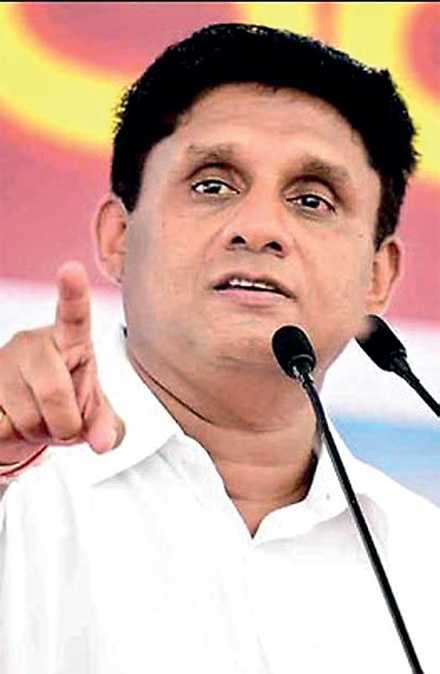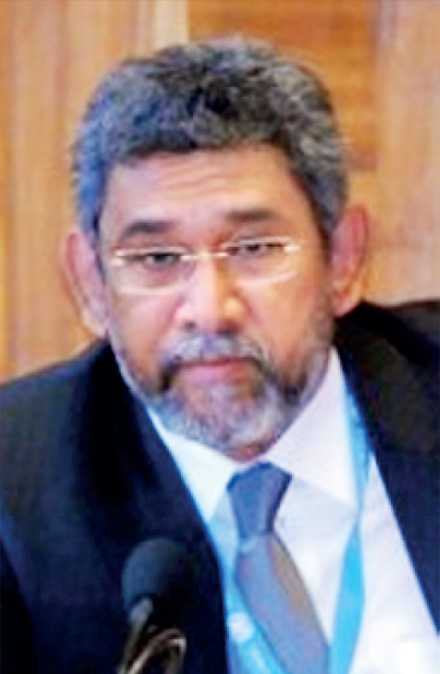Thursday Feb 19, 2026
Thursday Feb 19, 2026
Friday, 23 April 2021 00:00 - - {{hitsCtrl.values.hits}}

Samagi Jana Balawegaya Leader Sajith Premadasa

SJB Foreign Policy Advisor Dr. Dayan Jayatilleka
 When I wrote earlier this week about what is expected from our largest Opposition party, the SJB, I did so hoping that the party would awake and articulate its vision for Sri Lanka, and its stand on the many gnarly policy decisions that face our country. I was heartened to see that the party had exercised the time-honoured journalistic tradition of right-of-reply to respond to my concerns and set out its policies on a number of thorny issues.
When I wrote earlier this week about what is expected from our largest Opposition party, the SJB, I did so hoping that the party would awake and articulate its vision for Sri Lanka, and its stand on the many gnarly policy decisions that face our country. I was heartened to see that the party had exercised the time-honoured journalistic tradition of right-of-reply to respond to my concerns and set out its policies on a number of thorny issues.
But I was surprised to see that the party’s response was penned not by an elected official of the SJB, but by the party’s Foreign Policy Advisor Dr. Dayan Jayatilleka.
While I remain personally unconvinced that Dr. Jayatilleka is indeed speaking for the majority of the SJB or its leadership, the “right of reply” is reserved for those who are directly affected by an article. So readers would be forgiven for believing that Dr. Jayatilleka writing on behalf of the SJB as its apparent theoretician. As he professes to do so, he must be afforded the benefit of the doubt unless the party chooses to disavow his positions. Assuming that he speaks for the SJB, his frank response has shed light on many hitherto unknown positions held by the party that tell us what to expect from a future SJB government.
It was also puzzling that my plea for the party to communicate its stances on the questions asked around the country and to position itself for victory in 2024 was interpreted by Dr. Jayatilleka as an “attack” on either the party or its Leader, Sajith Premadasa.
Most puzzling of all, was that many of the policies that Dr. Jayatilleka states are the official position of the SJB, seem contradictory to the views I have seen argued and elegantly articulated at least by a handful of senior MPs and party officials in their own capacities.
20th Amendment and executive presidency
Dr. Jayatilleka says that while the SJB opposed the 20th Amendment, it is also opposed to the reintroduction of the 19th Amendment. That is quite a surprising point of view, given how forcefully many SJB seniors, including its Leader Sajith Premadasa, argued passionately for the 19th Amendment and promised to defend it. He said the SJB has a similar position on the executive presidency, will not abolish it, and will instead make the best of it to serve the people, just as President Gotabaya Rajapaksa pledged to do.
This position too, may cause heads to turn in the party hierarchy, as many of the most forceful proponents of abolishing the executive presidency are now in the SJB leadership. They campaigned around the country on that platform and used it to usher Maithripala Sirisena into power.
It is because of such contradictions and a lack of clarity in the positions taken by various voices seeming to represent the SJB, that I posed many of my questions in the first place.
United Opposition
The SJB’s apparent theoretician, Dr. Jayatilleka also said it is the position of the SJB that forming a United Opposition Conference including other Opposition parties and civil society groups to stand together against the SLPP would be a “taint” on the party and a repeat of “sins of the past”.
This position too may come as a shock to SJB seniors like Dr. Rajitha Senaratne who invited these Opposition parties and civil society groups just this past August to stand together with the SJB in defence of the 19th Amendment.
The message Dr. Jayatilleka is sending to those Opposition parties and civil society groups who want to join hands to reintroduce the 19th Amendment and abolish the presidency is “leave us out of it”. It is the assessment of the SJB, Dr. Jayatilleka says, that the party will instead embrace the status quo endorsed by the “immense majority of the people”.
My fear is that dismissing the 19th Amendment and democratic reform are not policies of the “immense majority of the people” but are instead the personal policies of Dr. Jayatilleka. For all our sakes, I hope the elected officials of the SJB know the difference.
Economic and foreign policies
Dr. Jayatilleka says the SJB disavows the UNP’s economic and foreign policies. He says they led to electoral defeat. This may come as a surprise to Eran Wickramaratne and Dr. Harsha De Silva, who have convincingly defended their Government’s economic policies and results. Reversing their stand, Dr. Jayatilleka says the SJB will synthesise some new policy, taking ideas from all quarters including the government.
I have no economic policy prescription for the SJB. I am not an economist. I am a voter, and as a voter, when I listen to Government ministers selling the failed economic policy of the Podujana Peramuna, I would like to hear an alternate view. If it is indeed Dr. Jayatilleka’s role in the SJB to decide on economic policy, I humbly suggest that he do so with haste and articulate the party’s vision so people can compare it to that of the Government and feel that they have a choice.
The issue with foreign policy is similar. Dr. Jayatilleka agrees that the Government’s handling of foreign affairs has been a disaster. But in October 2018, when Dr. Jayatilleka supported Prime Minister Mahinda Rajapaksa’s 52-day constitutional coup d’état, he suggested to Prime Minister Rajapaksa that “we must have a very able, senior, experienced, politically mature, ideologically clear and consciously anti-imperialist Foreign Minister. I suggest Dinesh Gunawardena.” Verbatim, these are the words of Dr. Dayan Jayatilleka.
Dr. Jayatilleka is a seasoned diplomat, having been appointed as Sri Lanka’s ambassador to Russia twice, first by President Mahinda Rajapaksa and then by Yahapalanaya President Maithripala Sirisena. Today, he is foreign policy advisor to the SJB. Maybe he is struggling to formulate a compelling and winning foreign policy for the SJB because he still believes that Foreign Minister Gunawardena is the ideal man for the job. Whatever the reason, it is past time for us to know where the SJB stands on the foreign policy issues that are on the minds of the people.
The lack of attention I paid to the UNP and its Leader Ranil Wickremesinghe seems to have greatly upset Dr. Jayatilleka. The failings of Ranil Wickremesinghe and his fellow decision makers in the UNP are in the past. As with the SJB, the UNP is home to talented and promising politicians who cannot all be held responsible for the failures of their leaders, some of whom have dug their own political graves.
 Differences of opinion
Differences of opinion
Dr. Jayatilleka and I evidently disagree on a number of policy matters. For example, I believe strongly that joining hands with other Opposition parties, minority communities and civil society groups as a united front is key to defeating authoritarianism, but Dr. Jayatilleka believes such alliances would be an electoral burden or “taint” on the SJB. I have closely associated Sajith and most of the SJB leadership for many years. Several of them remain close friends. We have stood together, and we have also fiercely debated thorny issues, sometimes publicly. But Dr. Jayatilleka’s response to me was the first time I saw someone treat as a personal attack on the Party Leader what was a good faith attempt to debate policy or vision. To the extent that Dr. Jayatilleka dictates SJB doctrine, one can be forgiven for wondering how such attitudes would impact the culture of free media under an SJB Government with Dr. Jayatilleka roaming the corridors of power.
But whatever our differences today may be, they must not divide us. As evidenced by our respective writings, my policies and those of Dr. Jayatilleka could scarcely be further apart. But unlike during the 52-day crisis, today Dr. Jayatilleka and I can agree on a common objective. We would both like to see positive change in the political status quo.
We cannot live in the past
Dr. Jayatilleka laid out several examples of past opposition movements to explain why the SJB has not rushed to take aggressive steps to set out an alternate policy to the Government or to face the Podujana Peramuna head on. We cannot allow ourselves to live in the past. If the past is going to equal the future, Sri Lanka is doomed.
Most examples he cites are from a time before there was an internet or cheap international communications, before we understood climate change or the full extent of our natural heritage, and in an era where all opposition to governments was centred around political parties. But we only need to look to the growing number of activists with wide public support and no political affiliation to see how quickly times have changed.
It is an inescapable truth that the Podujana Peramuna Government has failed independently, faster and more spectacularly than any of the governments whose oppositions Dr. Jayatilleka cites. But it is frightening that, despite this failure, until the SJB can rally the country around an alternate set of arguments, ideas or ideologies, there is at least a minute possibility that the regime will get its political and propaganda act together and hoodwink the people yet again.
What does the SJB stand for?
To ensure this does not happen, the SJB must articulate the arguments, ideas and ideologies they stand for. To wait until the 2024 election, as Dr. Jayatilleka proposes, would be a fatal mistake. By then, it is too late to find out whether Dr. Jayatilleka, myself or someone else is right about what it is the SJB’s prospective voters want their party to stand for. The time to set out policies and build alliances is now, so that there is plenty of time to adapt and change course, or to educate the people on the policies that are in their interests.
One of the UNP’s fatal mistakes was to allow the so-called “joint opposition” to dominate the public discourse on policy matters. Throughout the Yahapalanaya government, no one in the regime effectively defended their policies or decisions, giving the Podujana Peramuna a monopoly on public consciousness. Whatever polices the SJB chooses to stand for, they must stand for them now, sell them now, and rally the country around them, now.
Defeating the Podujana Peramuna
The SJB has indeed done very well to knock out the UNP in such a short span of time. But in my opinion, the SJB should not see the UNP as its primary enemy. Defeating the Podujana Peramuna is an entirely different kettle of fish to defeating Ranil Wickremesinghe. To paraphrase Dr. Jayatilleka’s advice to the 52-day regime: “The initiative should never be allowed to see-saw. The offensive momentum should be seized and maintained by the new Opposition.”
My warning to the SJB is the very same as that written by Dr. Jayatilleka to Prime Minister Mahinda Rajapaksa in October 2018, when he advised him on how to successfully seize power from the democratically elected government.
“In the battle of arguments, ideas, and ideology,” Dr. Jayatilleka wrote to Mahinda Rajapaksa on 29 October 2018, “the enemy is on the offensive and we are on the defensive!” These words resonate today. The only difference today, from Dr. Jayatilleka’s perspective, is that Sajith Premadasa and the rest of the SJB who are defending democratic ideals are no longer his enemy.
Thus there lingers a question that will determine the destiny of the SJB. Does the party endorse the democratic policies and principles that have historically united Sri Lankans against authoritarianism, such as condemning racism and strengthening independent institutions?
Alternatively, does the SJB agree with nationalists who backed the 52-day coup, like Dr. Jayatilleka, that the way forward is to shun such liberal ideals, and chart a path capitalising on the failings of the incumbent government and appealing to nationalist sentiments?
In effect, do they want to borrow from the strategy that propelled Maithripala Sirisena to the presidency and succeed where he failed, or take a page out of President Gotabaya Rajapaksa’s path to victory in 2019 with a promise to succeed where he has failed?
While I firmly believe that the latter strategy would be a fatal error, the decision is not mine to make. It is up to the leadership of the SJB to chart their political destiny. As such, the future of their party lies squarely in their hands.